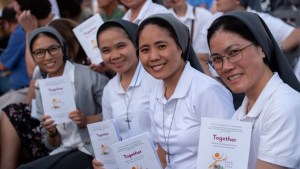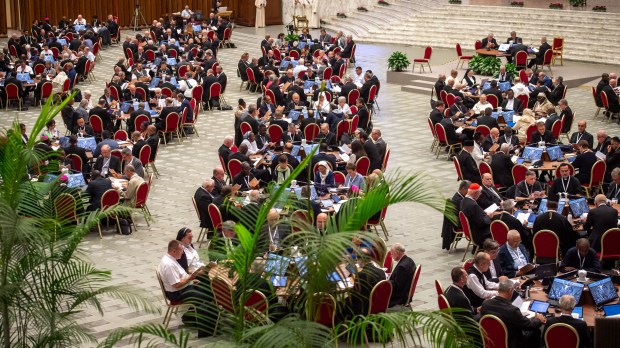There aren’t “police” handing out “punishments” to Synod members who speak to the media, commented the Prefect of the Dicastery for Communication, Paolo Ruffini, at a press briefing at the Vatican on October 6, 2023, the third day of the Synod.
Ruffini’s remark came in the context of attention on one of the members of the Synod, Cardinal Gerhard Müller, former prefect of the Dicastery for the Doctrine of the Faith, giving an interview to American Catholic TV channel EWTN.
Pope Francis had encouraged a “break” to listen and a “certain fasting from public speech” during the month-long proceedings, noting how press attention at previous synods failed to go beyond specific hot-button issues.
Cardinal Müller spoke somewhat positively of the proceedings thus far in his 10-minute interview.
“I have … a certain form of optimism, but at the end we must wait in what direction it will go and what will be the decisions behind the scenery. That is always the problem,” he said.
The former DDF prefect said the initial discussions were “very good,” and pointed out that the nature of the assembly has changed, since voting is now open to lay people and religious rather, than being reserved solely to bishops.
Against the rules of the Synod?
His intervention was described by some media outlets as “defying” the Pope, as the Synod’s rules stipulate that “participants are bound to confidentiality and privacy both with regard to their own interventions and other participants’ interventions.”
Without commenting on the German prelate’s remarks specifically, Paolo Ruffini emphasized the “personal discernment” that each member must have.
It’s not a question of “punishing or not punishing,” he said, while backing up the Argentine Pontiff’s request for discretion made at the opening of the Synod.
A wide range of topics discussed
On the morning of October 6, participants went back to participating in the general congregations after discussing in smaller language groups – circuli minores – the day before. Around the round tables located in Paul VI Hall, 18 group reports were read, and 22 individual speeches of 3 minutes each took place, explained Ruffini.
Synod members, who have been practicing this method of discussion for the past two years, spoke about a wide range of themes including: formation for clerics and laity alike; the interweaving role of ordained ministers and the laity, especially women; the phenomenon of migration; the risk of power-grabbing; clericalism and abuse; and the suffering Church in certain parts of the world, such as Ukraine.
All these themes were addressed in a very fraternal atmosphere and from very concrete angles, Synod representatives said.
In the afternoon, the “synod fathers and mothers” were to continue reading the group reports and making their own interventions.
At an earlier briefing, Ruffini had recalled that this assembly is “just one stage” in the synodal journey initiated at the local level in 2021.


